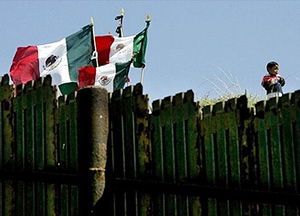 |
 |
 |
 Editorials | At Issue | October 2006 Editorials | At Issue | October 2006  
US Fence Won't Make Good Neighbors: Mexico, Latinos, Democrats
 Antonio Rodriguez - AFP Antonio Rodriguez - AFP


| | A young boy looks into the United States from Mexico along the US-Mexico border fence in San Ysidro, California. A fence along the US border with Mexico, which US lawmakers approved to stop illegal immigrants, became a sounding board for criticism from Mexico, Latinos and opposition Democrats weeks before elections. (AFP/Getty) |
A fence along the US border with Mexico, which US lawmakers approved to stop illegal immigrants, became a sounding board for criticism from Mexico, Latinos and opposition Democrats weeks before elections.

The US Congress on Friday approved building a 1,100-kilometer (700-mile) fence, and President George W. Bush was expected to sign it into law soon.

The head of the opposition Democratic Party, looking to wrest control of at least one house of Congress in November 7 legislative elections, said Republicans approved the wall Friday as a campaign stunt.

"This is typically Republican. They care about the election, but they don't care about anything else," party chief and former presidential candidate Howard Dean told AFP.

The Senate approved the measure Friday 80-19, with votes of 26 Democrats.

"It's just another foreign policy blunder," Dean said.

The legislation raised concerns in Mexico.

The foreign ministry "will send a note to the US government to voice its concern at the building of the wall; that has been the position of Foreign Minister Luis Ernesto Derbez and that remains the position," ministry sources said Saturday.

The note will address "the reasons the Mexican government does not believe this is the correct answer, and that it could become an insult between nations," the source added.

Bush called earlier this year for a multi-faceted response to the estimated 11.5 million undocumented workers living in the United States, including a guest worker program as a way for law-abiding undocumented workers to win legitimate status and even citizenship.

However, some conservative Republicans would not back Bush.

"Republicans have turned their back on Hispanics in the country. I think Bush tried to stop that but he couldn't," Dean said.

Earlier this year, the congressional get-tough response to Bush's initiative triggered the largest protests in the United States in decades, with a million mostly Latino immigrants in the streets.

The House of Representatives brushed off Bush's comprehensive reforms and preferred instead to build a wall and make illegal entry into the United States a criminal offense.

Of all the proposed reforms, only one was approved.

"The only one that is going anywhere is the fence," lamented Cecilia Munoz, of the National Council of La Raza, the largest US Latino organization.

"That bill authorizes the building of the fence, but doesn't appropriate the money for the fence. There is more symbolism than substance for that particular piece of legislation," she said.

The 2007 budget for the Department of Homeland Security provides 1.2 billion dollars for the fence, while a previous Senate measure said a 1,000-kilometer fence will cost 1.8 billion dollars.

Kevin Appleby, of the US conference of Catholic bishops, said, "Building a wall against the entire world is not a sign of strength and engagement, but is really a sign of weakness and fear."

Meanwhile, Democratic Senator Edward Kennedy said, "Fences won't stop illegal overstayers, who account for 40-50 percent of current undocumented population of the many who continue to come here to work."

Democratic Senate leader Harry Reid said in a statement, "The American people want realistic solutions, not piecemeal feel-good measures that will waste billions of precious taxpayer dollars and do nothing to correct a serious problem."

Republican Majority Leader Bill Frist said approval of the fence was just the first step on the way toward comprehensive immigration reform. | 
 | |
 |



